The 2025 Annual Conference of the Eastern Regional Organization for Public Administration (EROPA), themed “Public Administration in the Age of Populism, Polycrisis, and Technological Transformation: Dilemmas, Dynamics, and Directions”, officially commenced on October 1, 2025, in Tacloban City, Philippines. The event was co-organized by EROPA and the Philippine Society for Public Administration (PSPA). Assoc. Prof. Dr. Nguyen Ba Chien, President of the Academy of Public Administration and Governance (APAG) of Viet Nam and Chairperson of the EROPA Executive Council, delivered the opening remarks at the event. The conference took place from October 1 to 3, 2025. More than 500 delegates from Asia-Pacific countries and other nations, including China, the Philippines, Viet Nam, Japan, the Republic of Korea, Thailand, Indonesia, Nepal, Timor-Leste, the United States, Bangladesh, Canada, Kazakhstan, and Malaysia, participated in the event. In addition to the opening ceremony and four plenary sessions, the conference featured numerous sub-plenary and parallel sessions focusing on key topics, including populism, polycrisis, technological transformation, inclusive governance, and public administration training. Nearly 100 leading regional speakers and 135 academic papers were presented.
Opening ceremony
The conference officially commenced on October 1, 2025. In his opening address, Dr. Ederson Dt. Tapia, President of PSPA, warmly welcomed the distinguished guests, colleagues, scholars, and students to the international conference co-hosted by PSPA and EROPA in Tacloban. He emphasized that the conference was taking place in a period when global public administration systems are under tremendous pressure, from the rise of populism, overlapping crises, and the unprecedented pace of technological development that often outstrips the ability of law and policy to adapt. He noted that although administrative systems are frequently criticized for being bureaucratic, corrupt, and inefficient, they remain the backbone that ensures continuity in national governance.
Highlighting the urgency of the conference theme, Dr. Tapia stated that it reflects the critical challenges of safeguarding administrative integrity, reshaping leadership images amid polarization, and managing compounded crises that call into question the role of public administration in times of uncertainty. He affirmed that the conference serves not only as a venue for academic exchange but also as a platform for debate, dialogue, and collective innovation to renew administrative systems, uphold integrity, strengthen public trust, and enhance governance resilience.
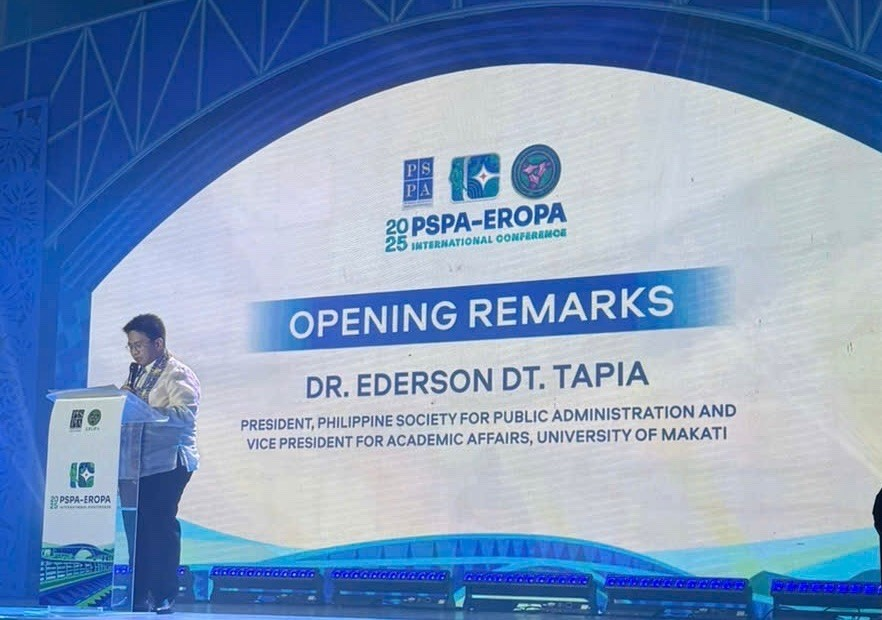 Dr. Ederson Dt. Tapia, President, Philippine Society for Public Administration and Vice President for Academic Affairs, University of Makati, delivers the opening remarks.
Dr. Ederson Dt. Tapia, President, Philippine Society for Public Administration and Vice President for Academic Affairs, University of Makati, delivers the opening remarks.
On behalf of EROPA, Assoc. Prof. Dr. Nguyen Ba Chien, President of APAG of Viet Nam and Chairperson of the EROPA Executive Council, delivered the opening remarks at the 2025 PSPA–EROPA International Conference. Assoc. Prof. Dr. Nguyen Ba Chien warmly welcomed all delegates and emphasized the special significance of holding the conference in Tacloban – a land that has endured great losses yet risen with strength and vitality, becoming a symbol of resilience and faith. According to him, the “Tacloban spirit” embodies the very essence of public governance in turbulent times: turning crises into opportunities, and transforming adversity into strength for innovation and cooperation.
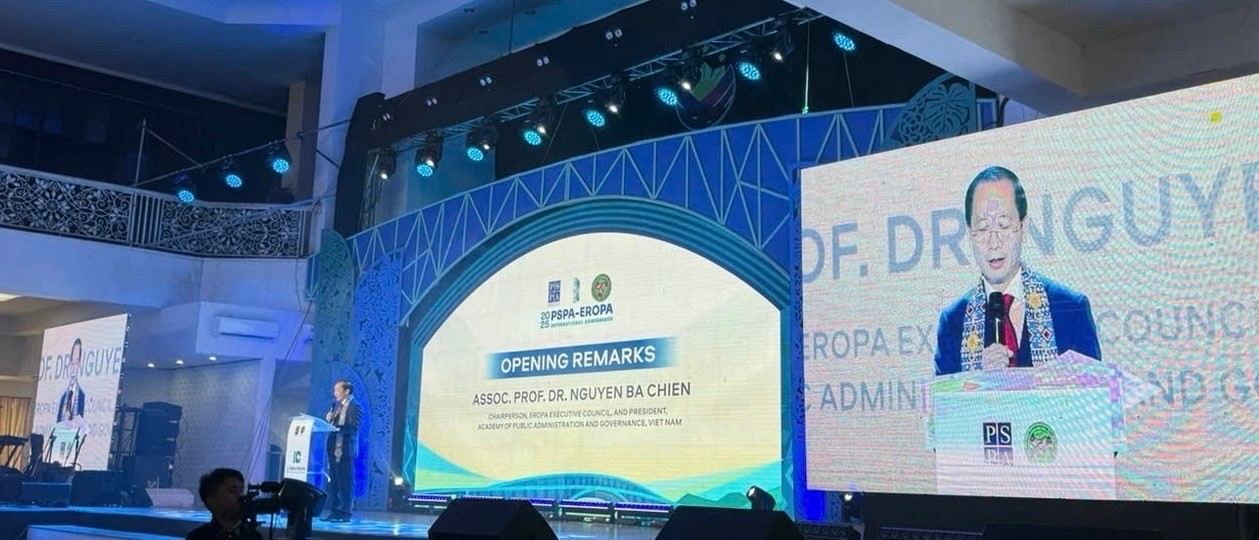 Assoc. Prof. Dr. Nguyen Ba Chien, President of the Academy of Public Administration and Governance (APAG), Viet Nam and Chairperson of EROPA Executive Council, delivers opening remarks.
Assoc. Prof. Dr. Nguyen Ba Chien, President of the Academy of Public Administration and Governance (APAG), Viet Nam and Chairperson of EROPA Executive Council, delivers opening remarks.In his remarks, Assoc. Prof. Dr. Nguyen Ba Chien stressed that in the face of unprecedented challenges, public administration must be grounded in its core values - justice, accountability, and public service ethics - while enhancing its foresight, resilience, and creativity in the service of humanity. Reform and innovation, he noted, only hold true meaning when they place people at the center, aiming toward inclusive, equitable, and sustainable development. Public administration is not merely about institutions or policies; it is a profound commitment between the state and its citizens. Like the bamboo in East Asian culture - flexible in storms yet unbreakable - a public administration must be adaptive, creative, and resilient, while remaining firmly rooted in its core values namely citizen service, accountability, and the protection of human dignity.
With strong faith in collective wisdom and the power of cooperation, Assoc. Prof. Dr. Nguyen Ba Chien expressed his hope that the conference would become a forum that inspires intellectual dialogue, courage through action, and solidarity in shaping the future. He affirmed that this is also the shared mission of EROPA and PSPA: to connect cultures, share knowledge, and jointly build a modern, effective governance system that serves the common good for peace, security, and prosperity for all.
On behalf of the Philippine Civil Service Commission, Atty. Marilyn Barua-Yap, Chairperson the the Philippine Civil Service Commission , warmly welcomed all delegates to the conference. She emphasized that today’s civil service faces major challenges, requiring public governance to continuously adapt, respond swiftly, and innovate in order to build a smarter, more effective, and citizen-centered government. Recalling the story of Tacloban’s remarkable recovery after disaster, she highlighted that resilience in the face of adversity becomes immensely powerful when governments, citizens, and international organizations act with integrity, courage, and solidarity. On behalf of the Philippine Civil Service Commission, she reaffirmed the Commission’s commitment to action, not only within the Philippines but also in close cooperation with international partners across the Asia-Pacific region, to build institutions that are adaptive, inclusive, and future-ready.
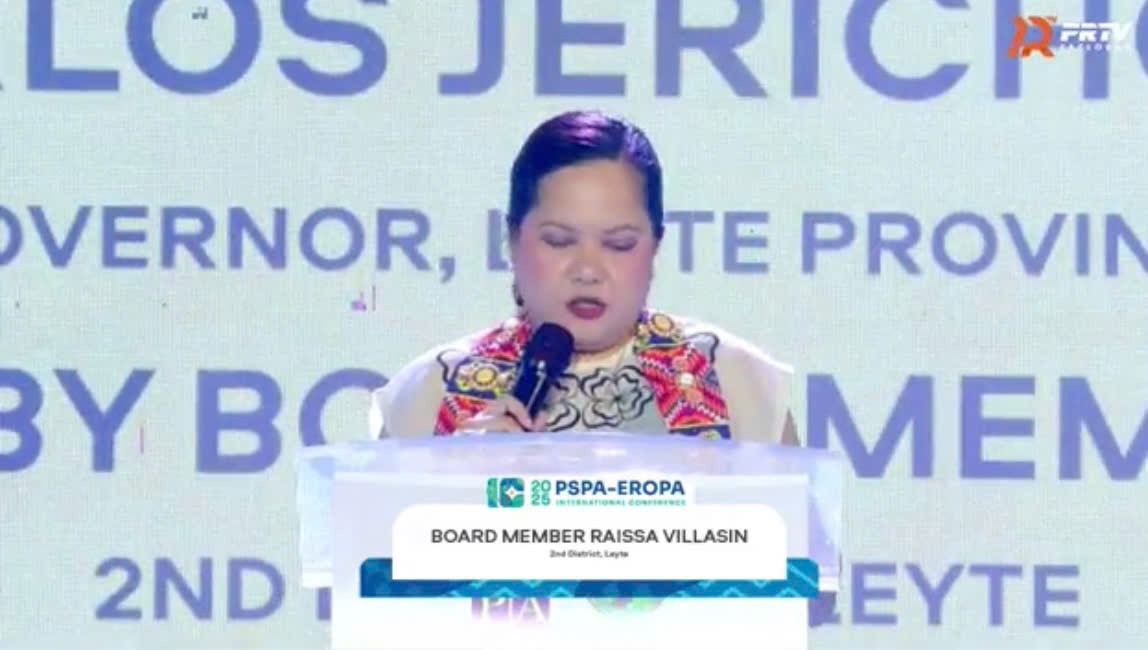 Hon. Raissa Villasin delivers welcome messages.
Hon. Raissa Villasin delivers welcome messages.
Representing the Governor of Leyte Province, Mr. Carlos Jerricho Petilla, Ms. Raissa Villasin, Board Member of Leyte Province; Hon. Christopher Esperas, City Councilor of Tacloban City; and Dr. Patricia B.Arinto, Dean of the University of the Philippines Tacloban College, attended and extended their welcome messages to the conference.
Main program of the conference
In addition to the opening ceremony and four plenary sessions, the conference featured several sub-plenary and parallel sessions focusing on key topics, including populism, polycrisis, technological transformation, inclusive governance, and public administration training. The event drew more than 500 participants, including nearly 100 leading speakers from the fields of public administration and governance, as well as 135 academic papers presented throughout the conference.
1. Plenary sessions
Plenary 1: Public opinion and the populist surge: Implications for governance
The first plenary session was moderated by Dr. Gary Ador Dionisio, Vice President of PSPA and Dean of the School of Diplomacy and Governance, De La Salle College of Saint Benilde. The plenary speakers were Dr. Robin Garcia, CEO of WR Advisory Group; Prof. Cleve Arguelles, President and CEO of WR Numero Research; and Prof. Ranjit Rye, President and CEO of OCTA Research and Assistant Professor at the University of the Philippines.
Opening the session, Tacloban was highlighted as a symbol of resilience and reconstruction after natural disasters, serving as a metaphor for the endurance of public administration amid political and social upheavals. The speakers emphasized that in an era marked by populism, polycrisis, and digital transformation, public administration must move beyond traditional models and reshape institutions - not only for administrative efficiency but also to strengthen public trust and responsiveness to citizens’ needs. The session also explored the challenges of a “knowledge crisis,” in which truth is distorted by extremist political narratives and misinformation. The central message underscored the importance of evidence-based communication, democratic accountability, and serious public opinion research to guide policymaking in an increasingly unstable environment.
Plenary 2: Civil service and public sector transformation: Issues, concerns, and challenges
The second plenary session was moderated by Prof. Dr. Alex Brillantes, Jr., Secretary-General of EROPA. The panel featured H.E. Mr. Agostinho Letêncio De Deus, President of the Civil Service Commission of Timor-Leste; Prof. Dr. Agus Pramusinto, President of the Asian Association for Public Administration and the Indonesian Association for Public Administration; Dr. Akhlaque Haque, President of the South Asian Network for Public Administration; Hon. Jude A. Acidre, Representative of Tingog Partylist; and Dr. Alikhan Baimenov, Chairman of the Steering Committee of the Astana Civil Service Hub, Kazakhstan.
The discussion focused on barriers to civil service reform, including cultural resistance and declining morale within the administrative system. Speakers from Timor-Leste, South Asia, and the Philippines agreed that performance evaluation systems and legal frameworks alone are insufficient without an ethical foundation. Civil service transformation, they argued, must begin with values, ethics, and human dignity, not merely with management systems. Corruption, they noted, should be viewed not only as a technocratic issue but also as a moral and cultural one, requiring comprehensive reform. Additionally, the session identified emerging challenges posed by artificial intelligence, misinformation, and the erosion of public trust, calling for collective action to build a people-centered public administration.
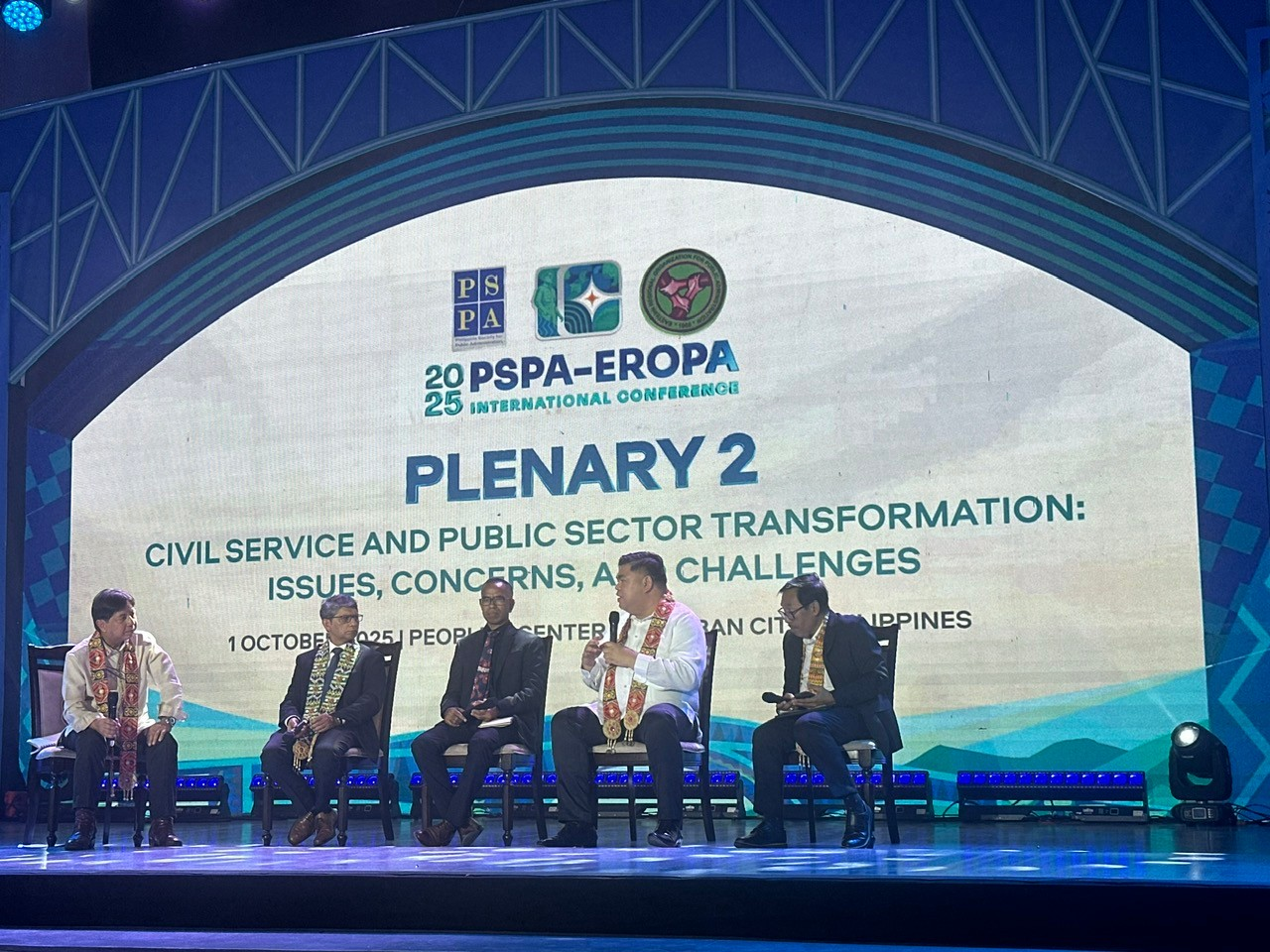 Plenary speakers at Plenary 2.
Plenary speakers at Plenary 2.Plenary 3: Public administration and polycrisis: Challenges and directions
The session was moderated by Dr. Enrico Basilio, Director of the Center for Policy and Executive Development (CPED) and Associate Professor at the National College of Public Administration and Governance, University of the Philippines. The plenary featured Atty. Raul Corro, Councilor of Muntinlupa City, Philippine Councilors League Chairman, ULAP National Executive Board Member and ULAP Chairman of Policy and Advocacy; Dr. Masao Kikuchi, Professor at Meiji University (Japan), Board of Directors of the Asian Association for Public Administration, and Chair of EROPA Future Plans and Programs Committee; Dr. Vincent Wong, Chair of the EROPA Resolutions Committee; and Prof. Dr. Khairul Mulux, President of the Indonesian Association for Public Administration.
The discussion in Plenary 3 highlighted the impacts of multidimensional crises on institutions, communication, and social trust. The case of Japan was presented as evidence of the risks associated with overly centralized structures, which can hinder emergency responsiveness. Indonesia’s experience demonstrated that fiscal reform could reallocate resources toward social priorities, strengthening equity. Models of leadership and governance that emphasize foresight and the enhancement of ethical values were proposed as the foundation for building agile, responsive, and resilient governments.
Plenary 4: Technological transformation as a driver of public sector innovation
The session was moderated by Dr. Sonia Fontanilla-Pimentel, Dean of the College of Governance and Public Policy at the University of Makati and Board Member of the Philippine Society for Public Administration. The plenary speakers included Hon. Ernesto V. Perez, Director General of the Anti-Red Tape Authority (ARTA) of the Philippines; Engr. Allan Cabanlong, Regional Director for Southeast Asia Hub at the Global Forum on Cyber Expertise; and Dr. Tirso A. Ronquillo, President of Batangas State University and President of the Philippine Association of State Universities and Colleges (PASUC).
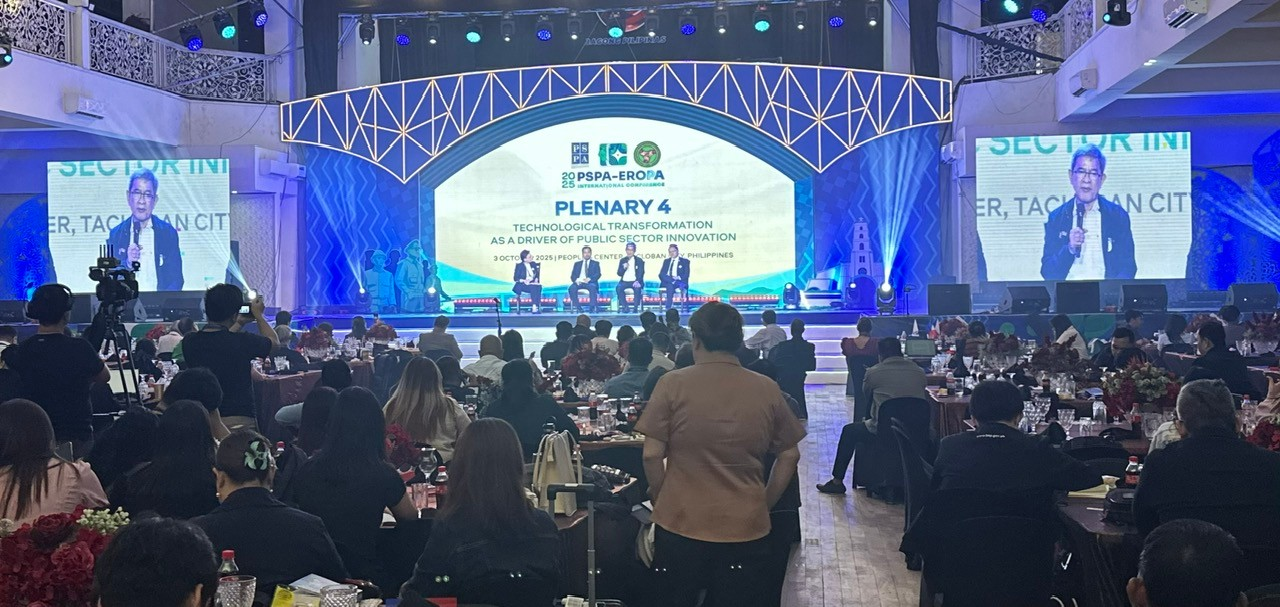 Plenary 4.
Plenary 4.The session underscored that digital technology has become a key driver of administrative reform, with models such as ARTA’s eBOSS and PBIS systems facilitating licensing and public service delivery. However, speakers also cautioned that cybersecurity remains a fundamental element to ensure citizen trust and the sustainability of digital systems. Notably, the KIST Park initiative of Batangas State University was introduced as a model of academia-industry-government collaboration, transforming research into practical solutions that serve the public.
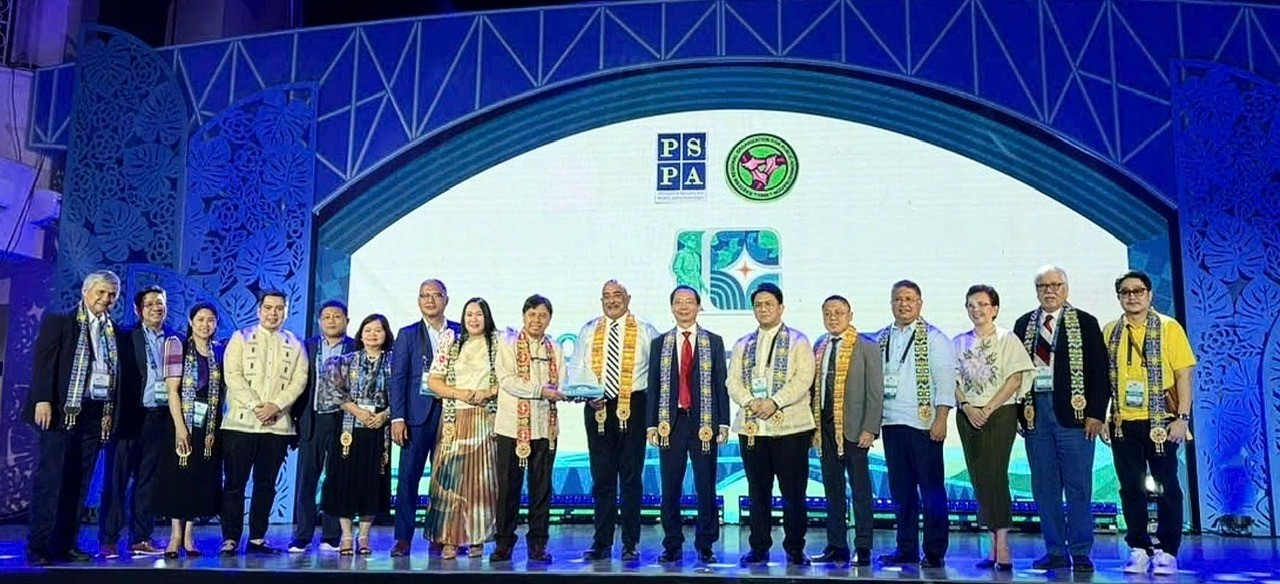 The Chairperson of the EROPA Executive Council, the EROPA Secretary-General, and the President of PSPA, with the delegates.
The Chairperson of the EROPA Executive Council, the EROPA Secretary-General, and the President of PSPA, with the delegates.2. Parallel sessions
Parallel session 1: Enduring foundation: Conversations with the pillars of Philippine public administration
In parallel session 1, experienced scholars reaffirmed that values such as ethics, responsibility, equity, and service are the core elements that distinguish public administration from business management. They warned against superficial reforms and emphasized the importance of combining theory with practice, as well as discipline with compassion, in public administration education and practice.
Parallel session 2: Driving local transformation: Innovations in budgeting, capacity building, and service delivery
This session focused on practical innovation models, including participatory budgeting reform by the LGU DBM, ARTA’s digital training system, and community-based initiatives from Barangay Talobot and the Galing Pook Foundation. The key message emphasized in parallel session 2 was that sustainable reform must be grounded in local capacity and community co-creation.
Parallel session 3: Deans’ panel on public administration education
In this session, leaders of public administration schools highlighted the need to modernize academic programs to align with practical realities and social demands, while maintaining ethical foundations and a service-oriented mission. Speakers proposed the establishment of a national policy framework to safeguard and enhance the status of public administration education and training, aiming to nurture a team of civil servants who possess both managerial competence and moral integrity.
Parallel session 4: Behind the pages: Journal editors on advancing public administration research
In this session, editors from leading academic journals discussed the challenges of sustaining academic rigor, the issue of transparency in using AI for academic writing and peer review, and the need to strengthen research capacity in the Global South. The session underscored that public administration research must be interdisciplinary, inclusive, and connected to global governance practices.
In addition, the program featured several other thematic sessions with the participation of international speakers such as Dr. Masao Kikuchi (Japan), Prof. Akio Kamiko (Japan), Dr. Enrico Basilio (Philippines), Dr. Alex Brillantes, Jr. (EROPA), along with researchers and leaders from Viet Nam, Korea, Indonesia, Nepal, Canada, and many other countries.
Closing ceremony
In her closing remarks, Dr. Sonia Fontanilla-Pimentel, Dean of the College of Governance and Public Policy, University of Makati, and Board Member of the Philippine Society for Public Administration, summarized the core messages of the conference as follows:
1. Public administration is the cornerstone of democratic recovery and sustainable development. It is not merely a technocratic instrument but an ethical foundation and a social commitment.
2. Crisis presents an opportunity for institutional reconstruction. Governments must transform challenges into drivers of innovation, foster stronger citizen engagement, and build adaptive systems.
3. Technology has value only when paired with ethics and trust. Digital transformation must rest on cybersecurity, transparency, and genuine collaboration.
4. Institutions for public administration education and training serve as the pillars for shaping a civil service that combines competence, courage, and ethics, thereby defining a modern, service-oriented, and developmental public administration.
5. Values and ethics remain the immutable foundations of public administration. Whether in the age of populism or artificial intelligence, ethics, responsibility, and equity remain the core principles of governance and public service.
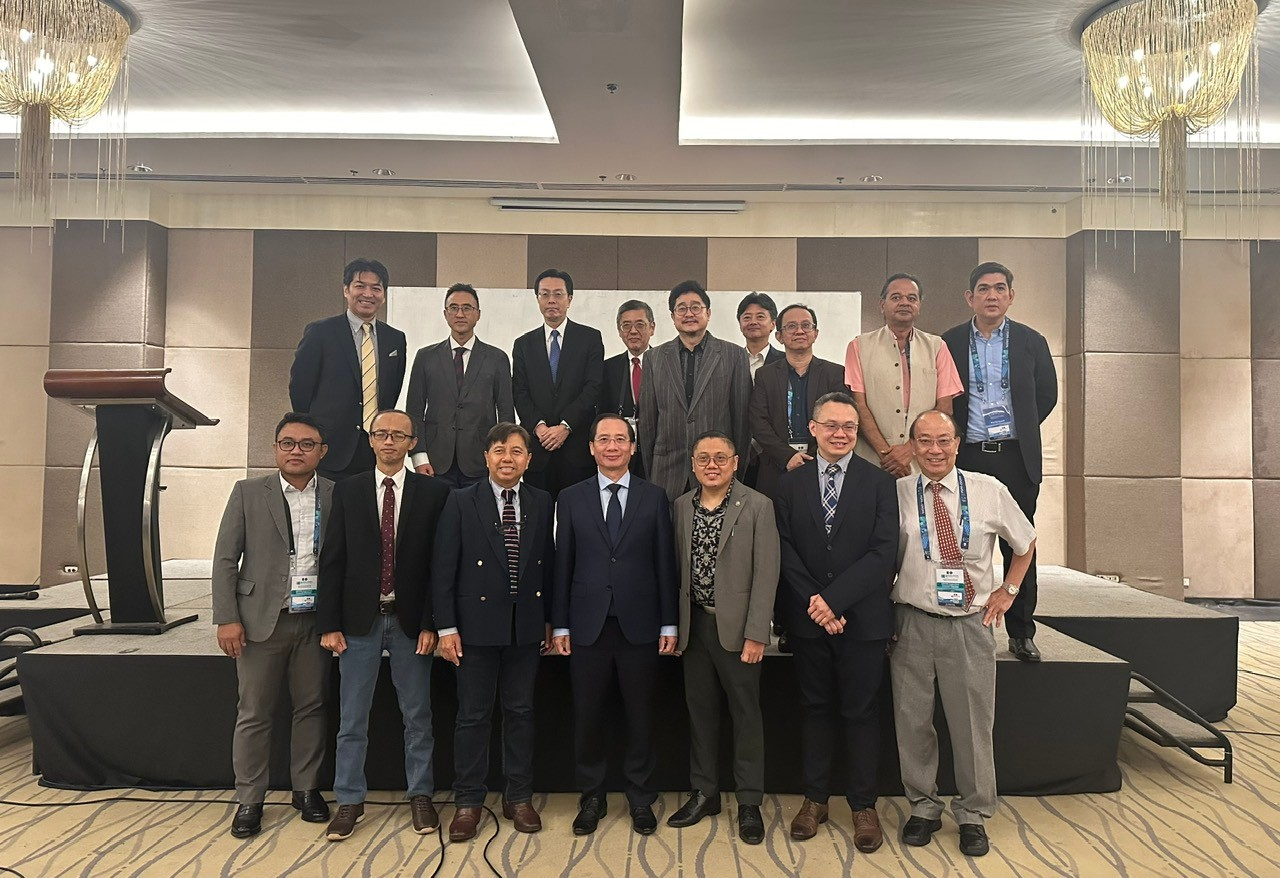 Members of the EROPA Executive Council at the conference.
Members of the EROPA Executive Council at the conference.
In his closing remarks, Prof. Dr. Alex Brillantes, Jr., Secretary-General of EROPA, commended the remarkable achievements of the 2025 PSPA-EROPA Conference, which brought together over 500 international participants, nearly 100 speakers, and 135 scholarly papers. He emphasized that the conference not only facilitated profound academic discussions on populism, polycrisis, and technological transformation but also reaffirmed the enduring values of public administration: integrity, accountability, equity, and service to the people.
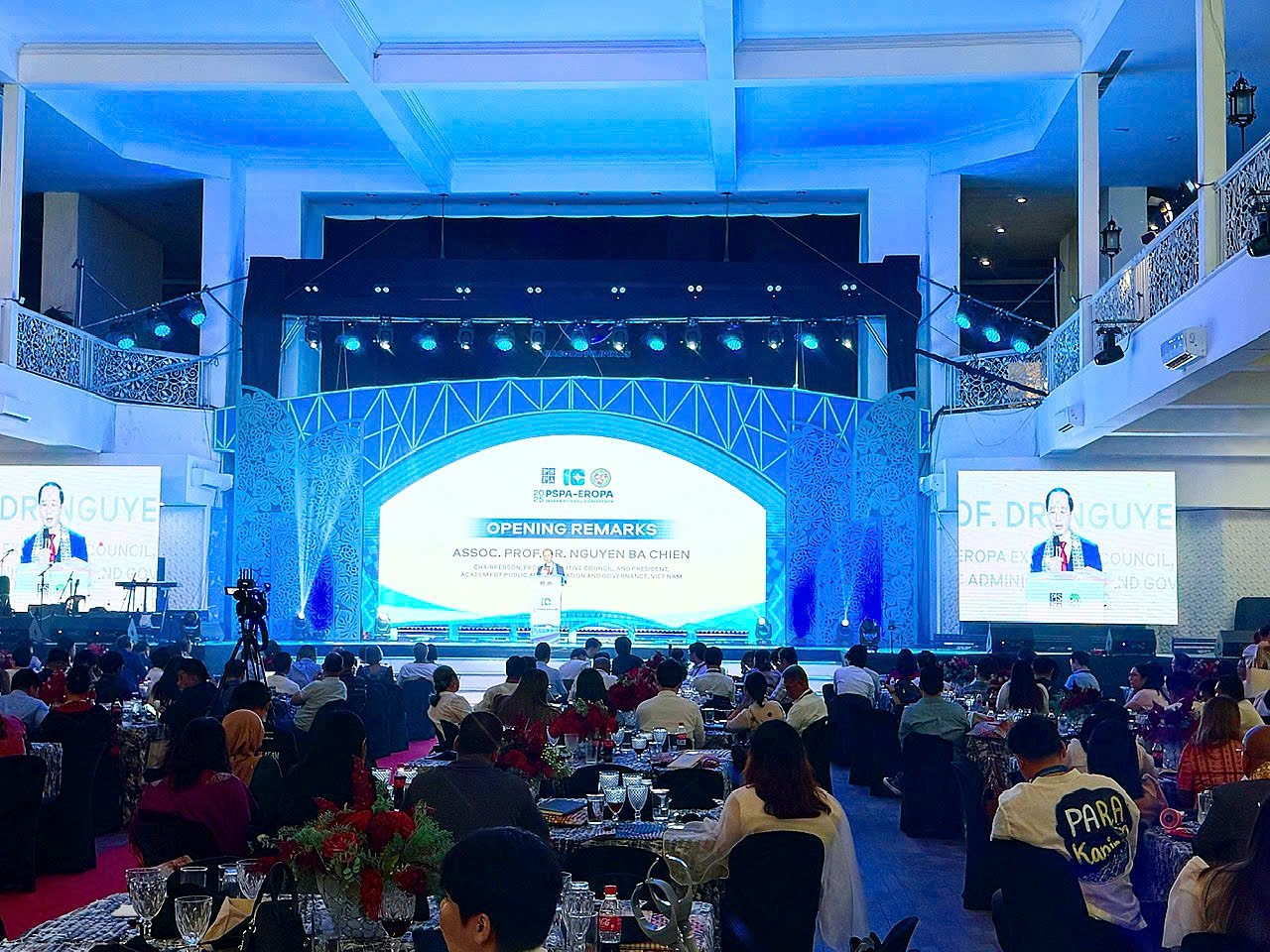 At the 2025 EROPA Conference.
At the 2025 EROPA Conference.
On behalf of EROPA, Prof. Dr. Alex Brillantes Jr. expressed sincere appreciation to the Government of the Philippines, the Civil Service Commission, the PSPA, the local government and people of Tacloban City, as well as the universities and partner organizations that contributed to the success of the conference. He also extended heartfelt gratitude to the leaders, speakers, scholars, and participants who shared their intellect, passion, and spirit of cooperation.
He affirmed that the connections and ideas generated in Tacloban will continue to inspire and strengthen regional and international cooperation, contributing to the development of a modern, humane, and sustainable system of public governance.
The 2025 EROPA Conference concluded with a resounding message: In times of uncertainty, public administration must uphold its core values, remain flexible and innovative, and continue to serve as both the anchor of public trust and the engine of renewal.
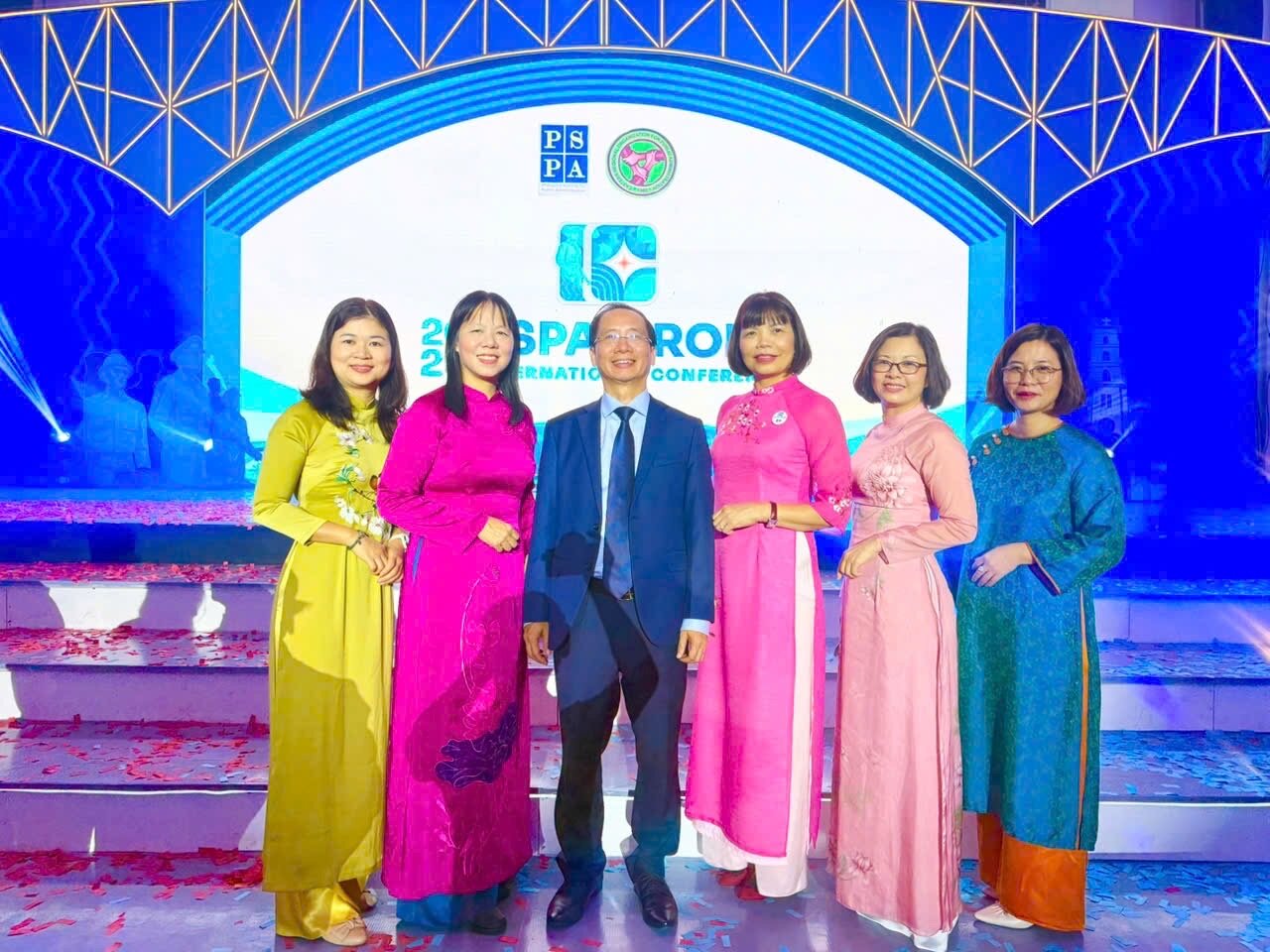 The APAG delegation at the 2025 EROPA Conference.
The APAG delegation at the 2025 EROPA Conference.The Eastern Regional Organization for Public Administration (EROPA) is the first organization in the Asia-Pacific region dedicated to advancing public administration and promoting economic and social development through collaborative research, theoretical development, and the improvement of administrative and governance systems and practices among member countries. EROPA currently has 11 State members: Japan, the Philippines, Thailand, the Republic of Korea, Iran, Indonesia, Nepal, India, China, Malaysia, and Viet Nam. In addition, EROPA has approximately 100 institutional members, including academies, schools of public administration, universities, and organizations working in the field of public administration, as well as over 600 individual members. The Academy of Public Administration and Governance (formerly the National Academy of Public Administration) became a State member of EROPA in 1991. Over the past three decades, APAG has actively participated in EROPA’s activities, demonstrating its professional capacity and strong reputation within the organization. Assoc. Prof. Dr. Nguyen Ba Chien, President of APAG, currently serves as Chairperson of the EROPA Executive Council for the 2024-2025 term.